#Unknown the series spoilers
Explore tagged Tumblr posts
Text
Unknown ep 11 nc scene edited in order without the flashback montages. I didn't want to change the sound because of the moans/kissing noises... I tried my best, enjoy!
#Unknown spoilers#Unknown the series spoilers#unknown#unknown bl#unknown series#yuanqian#taiwanbl#taiwanese bl#unknown the series#bl series#yuan x qian
2K notes
·
View notes
Text







Their first morning after and the tenderest of snuggles and comfort.
#unknown bl#qian x yuan#taiwanese series#yuan x qian#unknown series#zhiyuan x qian#unknown the series#taiwan bl#taiwanese bl#taiwanese drama#taiwanese bl drama#taiwanese bl series#bl drama#bl series#asianlgbtqdramas#asian lgbtq dramas#unknown the series spoilers
1K notes
·
View notes
Text
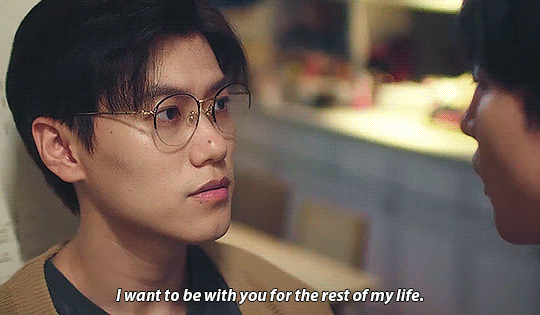
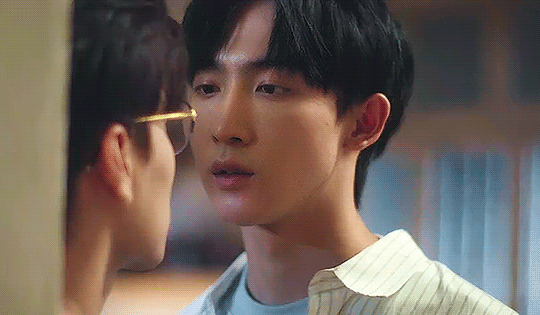

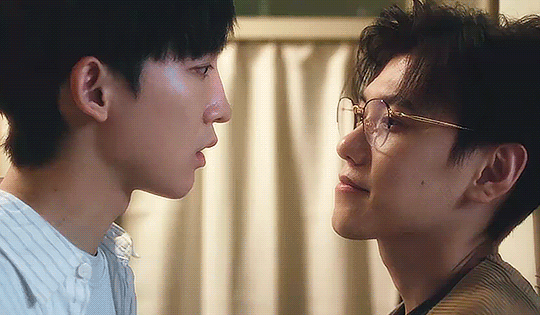

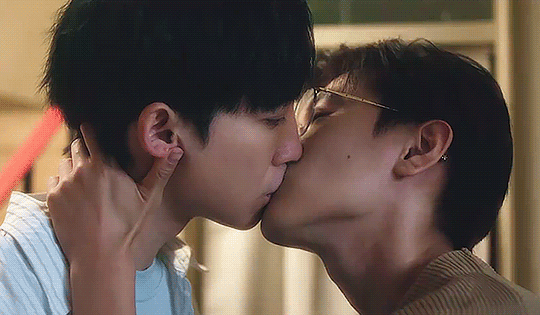


I want you to rely on me when you're down. I want you to be able to tell me anything on your mind. I want to be with you for the rest of my life. Can I?
935 notes
·
View notes
Text
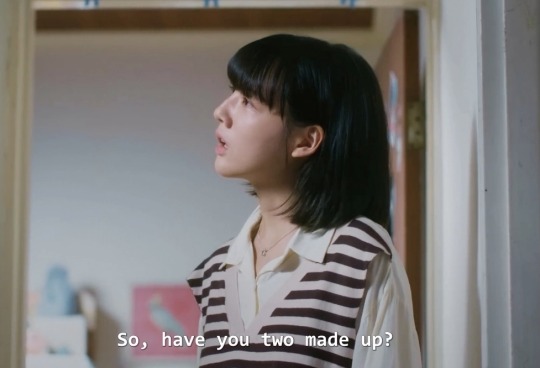



a comedy
605 notes
·
View notes
Text
Why did they cut THIS from THAT scene?? WHY??? It would have changed the mood of Yuan question to Qian!!
Evil Editors Clan you have just one way to make peace with us: GIVE US ALL THE CUT SCENES
NOW!!!!!!!!!
#unknown the series#qian x yuan#chris chiu#kurt huang#taiwan bl#taiwanese series#taiwanese actors#unknown the series spoilers
497 notes
·
View notes
Text
I need everyone to understand how incredibly hard it is to shoot this angle and make it look as natural and intimate as it does.
Please appreciate the camera work, acting & direction that went into these 5 seconds.

This is some award-winning-level shit. I'm absolutely serious.
430 notes
·
View notes
Text

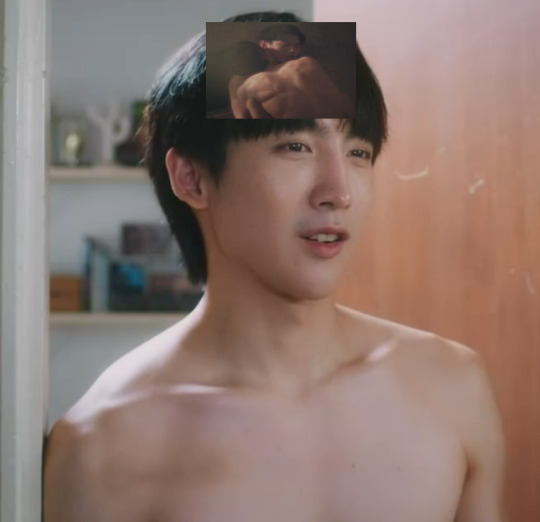

We made up.
219 notes
·
View notes
Text

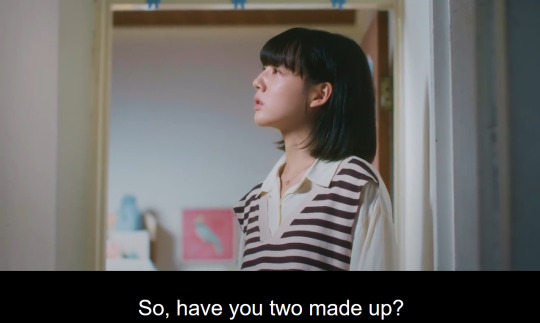


OMG SHUT YOUR FACE UP 😅
249 notes
·
View notes
Text
"Top", "Bottom" Discussion in Unknown ep. 12
The Office Gossip Scene
[Edited on 10th May; changes under clarification headings]
Now that the Unknown has resurrected the conversation about gong shou, let’s talk about it. The what and the why, so to say. Thank you @1serotonindeficientgirl (whose post inspired mine).
I welcome critiques and corrections. So, please feel free to do so.
Scenes and subtitles
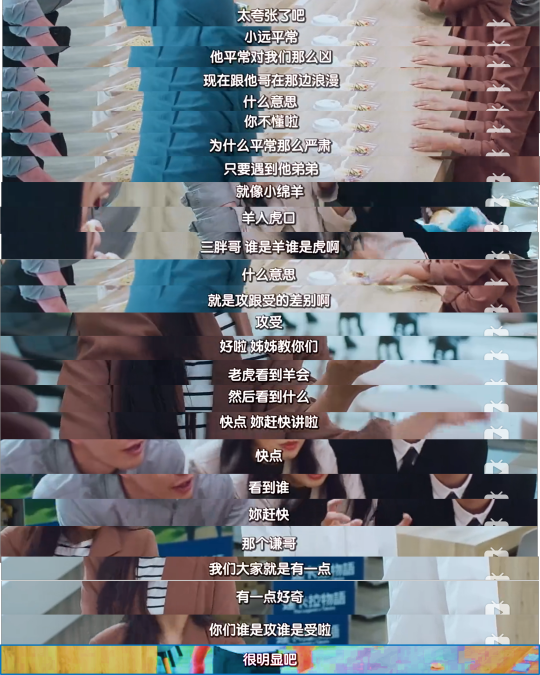
The discussion in the episode starts with Wei Qian’s staff gossiping about his relationship with Wei ZhiYuan. One of the staff members comments that Wei Qian is like a little lamb (小绵羊) when it comes to his little brother:
只要遇到他弟弟 就像小绵羊
Someone replies with the following idiom:
羊入虎口
(Literally: “a sheep enters a tiger's mouth”)
It means to enter a dangerous situation where one will certainly suffer [Source: Wiktionary].
The female employee (who witnessed their kiss) asks San Pang:
三胖哥谁是羊谁是虎啊 - Who is the lamb (羊; sheep) and who is the tiger (虎)?
This has some employees confused and they ask for an explanation. They receive the following reply:
就是攻跟受的差别啊 – [it means] between them, who is gong and who is shou?
One of the staff members repeats the unfamiliar terms:
攻受 – gong shou
and the fu-nu (腐女; fujoshi) offers an explanation:
好啦姊姊教你们 – let this elder sis explain
老虎看到羊会 – the tiger upon seeing the lamb…
Before she can complete her explanation, Wei Qian moves into the scene accompanied by the growl of a big cat. The gossipers disband.
In the end our fu-nu expresses their support for Wei Qian’s relationship with Wei ZhiYuan. Before she runs off, she throws him the question:
你们谁是攻谁是受啦 – between the two of you, who is gong and who is shou?
In the next shot Wei Qian is alone. He flexes his muscles and comments:
很明显吧 - It's obvious, isn't it?
[END OF SCENE]
Everyone at that office seems pretty close. The staff calls Wei “Qian ge” 谦哥 (first name + brother) and not as “Mr. Wei” (as the English subtitles suggests). Looks like Lao Xiong (emphasis on Lao = old) is the only one who clearly disapproves of such gossipmongering.
Notice how the terms gong and shou were translated directly into top and bottom in English subtitles. While that’s technically correct, there’s some nuance missing.
While there are tongzhi (同志;queer) people who use the terms gong and shou, these are not the most popular terms for top and bottom in the tongzhi community. This series specifically uses the terms gong (攻) and shou (受). Why? We’ll get to that in a minute.
In a BL, being shou means that character is the bottom in that particular ship. That character could be top, bottom, versatile or neither in another ship. A character is a bottom (as we use the term in English) only when that character is an absolute shou (sou uke in Japanese). An absolute shou is invariably shou. No matter which ship he becomes part of and no matter who he is paired with, he will be the shou. Similar difference exists between the terms “top” and “gong”.
English subtitles use ‘top’ and ‘bottom’ from the get-go. There is no need to explain what those terms mean. But that’s not the case with gong shou – only 腐 (fu) people (BL fans) really knows what those terms really mean and thus warrants explanation.
Clarification
[Edited. Thank you @abstractelysium and @wen-kexing-apologist for contributing to the conversation.]
As noted in the convo, Wei Qian is pretty ferocious in the office and is only gentle when it comes to Wei ZhiYuan. So, it is normal that gossiping irrespective of topic would end as soon as he arrives. Also, I think Wei Qian didn’t get what gong shou means other than allusion to tiger and lamb. The original language dialogues don’t make it clear that gong and shou means top and bottom (in a ship). [The English subs gives off that impression since gong and shou were simply translated.] Moreover, those terms are danmei literacies that has entered dictionaries but not necessarily public knowledge.
It is like an insider joke for fu-people made possible by Wei Qian’s ignorance. That wouldn’t have worked on Wei ZhiYuan who read danmei while growing up. That wouldn’t have worked if the fu nu (fujoshi) stuck around to explain what that means.
Usually in such conversations in BL, fu-people are shown to be mistaken: they either mess up the ship/dynamic (Love By Chance 1) or the character(s) in the ship deliberately trick them (Counter Attack). It is almost always played out with seme/gong’s approval in BL - not sure if that dynamic between fu-people & seme aka gong character ever appeared in any live-action dynamic. The trigger of this scene is Wei ZhiYuan’s deliberate choice of actions: PDA, kiss in the office right in front of a staff member.
BL literacies
BL is a media genre in itself with different sub-genres, genre conventions and classic works. It sure has a lot of overlap with other genres:
Romance as well as GL – they coevolved. They share mothers and other ancestors.
Queer – Is it really a genre? Even if one were to ignore queer as method in academia, it is still so complex.
Let me quote Taiwanese tongzhi author Chiang-Sheng Kuo:
… what exactly is queer literature? Is it queer literature if queer people like to read it, or is it only queer literature if there are queer characters in the books? Or is it an appendage of the queer movement? If a queer author writes a book without queer characters, does that represent a certain aspect of queer culture?
(You can find the whole interview here.)
Just as danmei (耽美; Chinese BL) has its roots in Japanese BL, so is gong (攻) and shou (受) from seme (攻め) uke (受け).
gong shou aka seme uke dynamics
Mother of BL, Mori Mari, didn’t come up with it, nor did her father Mori Ogai. Both she and her father, among the other dozen tanbi (耽美; same writing as danmei but different readings cause different languages, and different meanings cause different cultures) authors inherited it from authors before them who wrote on contemporaneous and historic Japanese male androphilia.
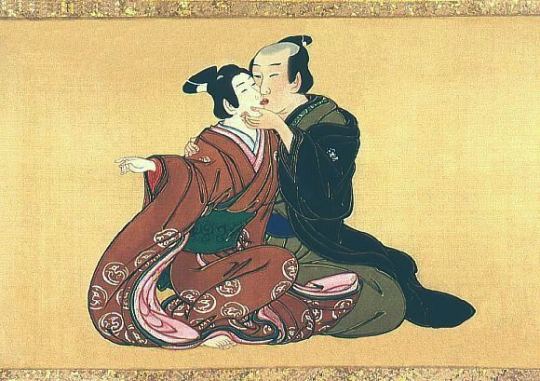
Spring Pastimes. Miyagawa Isshō, c. 1750 | seme uke dynamics in nanshoku pre-dates BL by hundreds of years.
While there is no dearth of riba (versatile) characters in BL, seme uke dynamics is:
a genre specialty. There are similar words in use in GL as well.
an enduring connection to the past of where BL was born.
remnants of a particular model of queerness; an alternative to LGBTQIA+ form of queerness.
What’s there in the scene
There is something hidden in the euphemistic explanation. On the face of it tiger devouring a lamb would be allusion to tiger gong devouring (topping) lamb shou.
But then tiger is a big cat and lamb is a herbivore. Neko (ネコ), the Japanese queer term for “bottom” means cat (etymology is obscure with this one). The term herbivore (草食) when used to describe a man means that man is masculine in a non-hegemonic way. In the series, Wei Qian embodies the hegemonic masculinity while Wei ZhiYuan is a quintessential grass-eater.
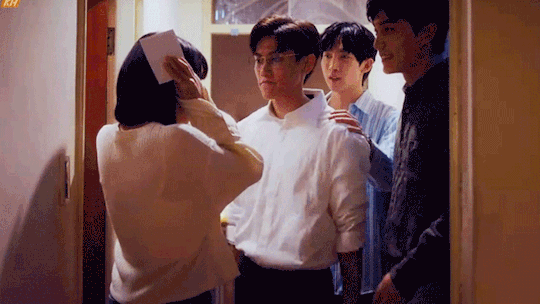
So, the description of lamb being devoured by a tiger would not be associated as simply as with the terms gong and shou especially when it comes from Taiwan which has been historically more connected to Japanese BL than any other BL producers (Sinophone or otherwise). This connection was highlighted during 魏之远 Wei ZhiYuan's naming scene where Le Ge used the borrowed Japanese possessive particle (の; no).
の = 之 (zhī)
The big cat sound effect for Wei Qian in particular adds to this. Wei Qian’s character is best described as a queen shou.
女王受 Queen shou: A shou who is as proud as a queen, and would devour gong. (source)
Wei Qian and Wei ZhiYuan’s ship is best described by Priest (the author of Da Ge, source novel of Unknown):
经典款毒舌女王和屁颠屁颠的忠犬组合 – paring of a classic, sharp-tongued queen and a tail-wagging loyal dog.
BL literacies & Affective learning
BL kind of has its own language (with words like gong shou), which fans use to share ideas and feelings. This secret language is what academics call ‘literacies.’ BL fans are all in on this and have their own ‘ways of behaving, interacting, valuing, thinking, believing, speaking, and often reading and writing’. Through ‘various visual, conceptual and textual literacies’, BL fans weave ‘an intertextual database of narrative and visual tropes which readers draw upon to interpret BL’. BL literacies is learnt through ‘affective hermeneutics – a set way of gaining knowledge through feelings.’ Audience learn BL literacies from BL works ‘which eventually leads to their active engagement’ with other BL fans. (source; Kristine Michelle L. Santos explains it in the context of Japanese BL but it applies to all BL media irrespective of where it is from.)
That scene in Unknown was set up to familiarize audience with BL literacies – not only those specific words but also the larger practice of imagining character pairing and indulging in that imagination. This is evident from the overall jubilant tone of the scene and the camera work. It is a celebration of moe. That is why we have a character who is not only a fu-nu but also willing to be openly fu-nu in that setting, sharing BL literacies and her colleagues interested to learn.
For other examples, check out Thomas Baudinette’s book Boys Love Media in Thailand: Celebrity, Fans, and Transnational Asian Queer Popular Culture. He has a chapter dedicated to explaining how genre conventions were taught to the early audience of Thai BL through similar scenes.

Why must they do this? Why break the fourth wall like this? To get more people interested in the intricacies of BL and to get them to participate in the culture. BL is created by fu-people and BL literacies are their tools and source of joy. BL must draw in more people to keep BL culture going. Commercialized BL we have today is the result of an affective culture formed over the years. It is built on years of labor of authors and their audience. I mean, look at the Unknown. This BL employs the well-developed Loyal Dog gong x Queen shou dynamics. Apart from that which the series took from the novel, it also drew upon other common BL beats to tease the relationship between Dr. Lin and his senior.
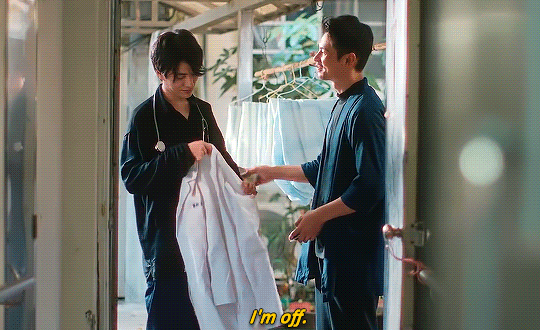
Teaching BL literacies is political. When Mainland Chinese government gets dangai productions to change names and relationships of characters (among other things), it is to prevent live-action audience from discovering BL as a genre with it disruptive potential. It is not only character's names and relationships that are changed. There are entire sub-genres of danmei (such as 高干) that got wiped out by censorship.
When a Taiwanese BL not only retains the character names & relationships and shows relatively explicit intimate scenes but also actively promotes BL literacies, it is an act of resistance. Discussion of gong shou, being genre specialty, manages to do so. Interestingly, they are doing it in an adaptation of a novel by Priest who has a particular reputation with self-censorship. That scene is not part of the source novel.
Heterosexual & gong shou
Association of bottom with the feminine (female or otherwise) has its roots in medicalization (and pathologization) of homosexuality in the west (such as through theories by scientists and doctors like Richard von Krafft-Ebing). This “knowledge” subsequently spread across the globe and was adopted to varying degrees and forms.
Moreover, the terms gong and shou applies to heterosexual pairing too.
BG (boy girl) ships have male gong and female shou
GB (girl boy) ships have female gong and male shou. [If this is interesting unfamiliar territory, check out the series Dong Lan Xue (2023).]

Moreover, if one is willing to look beyond LGBTQIA+ form of queerness (which is born and brought up in America), one can see other queer possibilities. For example, Kothi-Panthi queerness in South Asia which is characterized by explicit presentation of top bottom dynamics. There are very many similar forms of queerness in other parts of Global South.
In many cultures, sexuality doesn’t inform identity but sexual preference does. That’s why is you are to ask a kothi-panthi couple which one of you is the bottom, the kothi would tell you without hesitation: “I am.” Might even asked you in turn, “Couldn’t you tell?” For them, sexual preference (being kothi) rather than sexual orientation takes center stage. This is the inverse of how LGBTQIA+ form of queerness looks at it. While LGBTQIA+ model of queerness focuses on sexual orientation (being pan, ace, gay, etc.) as something that can be freely discussed but sexual preference (top, bottom, versatile, side, etc.) is considered private.
*Just to be clear, “kothi” is a term of self-identification. It means that the person is a bottom. Panthi is not self-identification. That’s how kothi address the men who top them.
While thanks to westernization LGBTQIA+ form of queerness enjoys more visibility, I think it is better to consider it as one type of queerness rather than the only model of queerness. Gong shou dynamics doesn’t fit into LGBTQIA+ form of queerness because it comes from another, much-older nanshoku model of queerness that made its way into Japan from China, hundreds of years ago. Friction between different models of queerness is common where ever they interact. In 1970s, Japan was witness to public debates between a younger, westernized Japanese queer activist Itō Satoru and other Japanese queer activists such as Fushimi Noriaki and Tōgō Ken who were rooted in indigenous tradition of male-male sexuality.
[Itō Satoru’s] insistence on the necessity of adopting western models of gay identity and coming out have brought him into conflict with other activists such as Fushimi Noriaki and veteran campaigner Tōgō Ken.
Interpretation and Orientalism: Outing Japan's Sexual Minorities to the English-Speaking World by Mark McLelland
Clarification
[Edited. Thank you @wen-kexing-apologist for contributing to the conversation.]
Under the LGBTQ+ model of queerness, it maybe considered inappropriate to have conversation about “top” “bottom”, especially in the office, going as far as to ask that to Qian ge. From that perspective, the BL audience (especially those who are unfamiliar with the terms gong and shou) are fair in their assessment of that scene being out of place or outright offensive.
I think things might have been a bit different if the subtitles retained the terms gong shou instead of “top” “bottom” since they aren’t exactly the same thing. That would have had the desired effect (of introducing BL literacies - gong shou in the context of 强强 (strong gong x strong shou) pairing) without unintended consequence.
What is considered rude under the LGBTQ+ framework is an essential part of fu culture. It is like addressing Wei Qian as just Qian – that could be considered rude in the original language but pretty normal in English. Different cultures, different norms, so to speak. It is only polite to be mindful of the cultural differences and avoid discussing about sexual preference where it is considered inappropriate.
As for the normalization of fu culture (especially discussions of gong shou), in my opinion the didactic scope of Unknown is undermined by the very fact that it is primarily a gǔkē danmei (via adoption (收养)) with tongyangxi vibes (highlighted multiple times by San Pang in the novel) associated with Wei ZhiYuan.
Somehow fu-culture gets judged by those who consume products of that culture. Everyone is happy with fu-cultural products as long as fu-people don't discuss who is gong and who is shou.
Why are fu-culture and BL always judged based on a culturally alien lgbtq+ form of queerness? Why must BL be arm-twisted to fit into norms of lgbtq+ form of queerness just because that is the most mainstream form of queerness?
-
That’s not much a conclusion but this is already so long. I really hope it gives you something to think about.
If you are interested, here's more.
#boys love#danmei#taiwanese bl#bl meta#bl history#bl analysis#unknown the series#unknown the series analysis#unknown the series meta#unknown#priest novels#unknown bl#unknown series#unknown the series spoilers#taiwanese series#taiwanese drama#chinese bl#chinese queer culture#danmei tropes#danmei novels#bl tropes#bl trivia#bl taiwan#unknown bl meta#unknown bl analysis#bl critique#bl novel#bl drama#yuan x qian#zhiyuan x qian
179 notes
·
View notes
Text
Yuan : *Loses his patience and his entire mind after years of yearning, aggressively declares his undying love and drags Qian to bed almost screaming I’LL SHOW YOU ROMANTIC LOVE *
Qian : Shouldn’t we go on a date first ? I didn’t even tell you my fantasies yet !
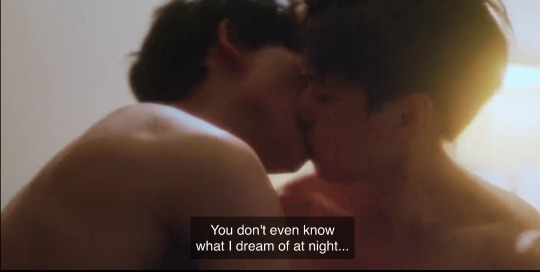
#unknown the series spoilers#unknown spoilers#unknown ep 11#unknown the series#qian x yuan#chris chiu#kurt huang#IT WAS SO FUNNY#Qian wants to date !#He actually took Baby ON A DATE
168 notes
·
View notes
Text
EDITED Unknown nc scene (2.0). The flow of this scene has been bothering me, I think it was the flipping of positions every few seconds mixed with flashbacks so I've attempted to edit it again. It's not perfect but I can't stop watching.
#unknown the series spoilers#unknown spoilers#unknown#bl series#unknown bl#yuanqian#taiwanbl#unknown series#unknown the series#taiwanese bl#yuan x qian#bl drama
1K notes
·
View notes
Text
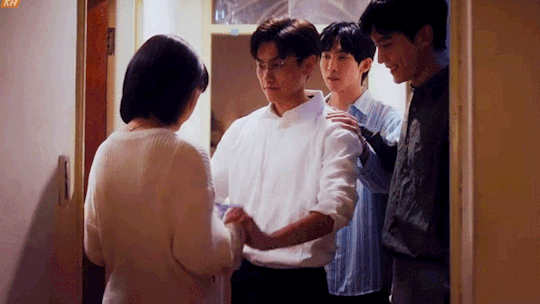
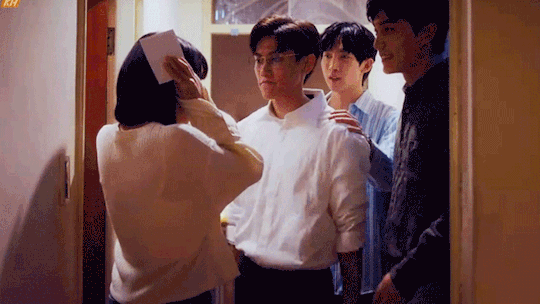
I love them so much. Every last one of them. Beloved and wonderful babies.
#unknown bl#taiwanese series#unknown series#unknown the series#taiwan bl#bl drama#bl series#asianlgbtqdramas#asian lgbtq dramas#taiwanese bl#taiwanese drama#unknown spoilers#unknown the series spoilers
968 notes
·
View notes
Text




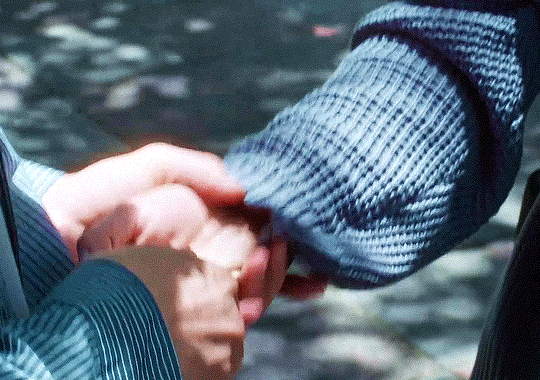
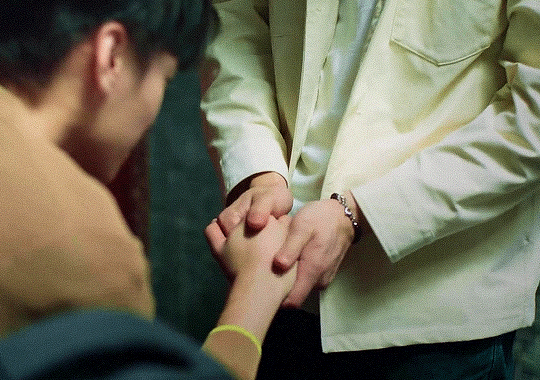


UNKNOWN 關於未知的我們 (2024) dir. Ray Jiang
219 notes
·
View notes
Text

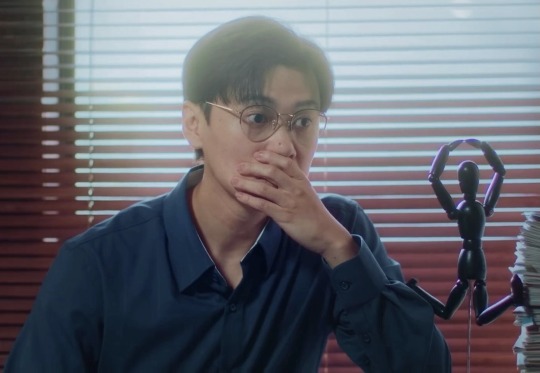


Qian might as well become a stay at home husband now that all his braincells were fucked out by Yuan, he won't get any work done no more
331 notes
·
View notes
Text
Qian blushing and getting all flustered just thinkin' about the night spent tg with Yuan...all those years of pent up desire must have done magic to Qian 😎🙌
#qian x yuan#unknown the series#chris chiu#kurt huang#taiwanese actors#taiwan series#taiwan bl#unknown the series spoilers
304 notes
·
View notes
Text
The new edited scene made by the production company of Unknown, from episode 11.
Try to spot the difference between this and a fan, ThoughtsAllDay, who made a remix herself.
#unknown the series spoilers#unknown#taiwanese bl#yuan x qian#qian x yuan#yuanqian#qianyuan#unknown the series#new edit
154 notes
·
View notes